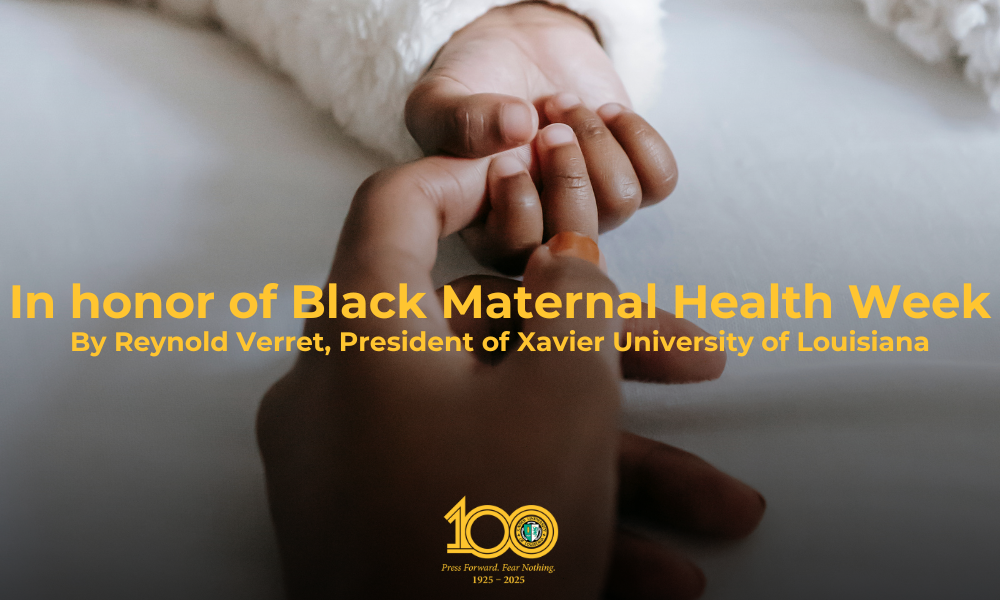In Honor of Black Maternal Health Week By President Reynold Verret

It’s troubling to read headline after headline about pregnant Black women not receiving necessary medical attention during labor - one of the most vulnerable times in their lives. We know of Tori Bowie and Serena Williams because of their star power, but this reality applies to Black women, known and unknown, who face a maternal health crisis in America. According to the Centers for Disease Control data, Black maternal mortality exceeds that of Hispanics and non-Hispanic whites by more than twofold. Here in Louisiana, we have one of the highest maternal mortality rates in the country.
It is why, each year, during Black Maternal Health Week, we recommit to ending pregnancy-related deaths, 80% of which are preventable in the United States.
Some of the causes for this unnecessary loss of life are known to us. To start, the legacy of segregation, discrimination, and policies that impoverish and marginalize reduce access to care. This has resulted in Black Americans, and especially Black women, facing higher rates of poverty, unemployment, and having less access to high quality education and childcare. These barriers, known as social determinants of health, impact health outcomes, making it harder for Black women to access quality and affordable health care. Black women also experience racism and bias from their medical providers, who often downplay their pain, deny care, and ignore symptoms.
To make matters worse, the United States is experiencing a growing shortage of physicians, including a very serious deficit of Black doctors. Despite Black Americans making up 13.6 percent of the population, they are only 5.7 percent of all U.S. physicians. This lack of representation in the health care system seriously impacts outcomes and undermines trust. Study after study demonstrates that when a health care provider shares the same race or ethnicity as their patient, patient outcomes improve, and health disparities diminish.
As the country's leading educator of Black and African American pre-med and pharmacy students, I am proud that Xavier University of Louisiana is a part of the solution to this crisis in maternal health. Our graduates, many of whom apply to medical school each year, are not only increasing the number of well-qualified physicians but are changing the face of medicine. We hope to do this at an even greater scale and impact by establishing the Xavier-Ochsner College of Medicine (XOCOM) in cooperation with Ochsner Health, the largest hospital system in Louisiana.
It will take more than an increase in the number of Black physicians to break down the barriers and ensure quality care for Black women. Xavier intentionally contributes solutions by broadly educating other health professionals and research scientists. Public Health Sciences at Xavier was recognized by the U.S. Department of Education as a stand-out program, which uniquely prepares students for impactful public health careers. Our Physicians Assistant program and the Ochsner-Xavier Initiative for Health Equity & Research contribute talent and sound thinking toward health equity in our region. And, our College of Pharmacy’s health sciences program is centered on eliminating health disparities. In fact, last week, the College hosted its 17th annual Health Disparities Conference with the theme, “Social Determinants to Health: Reaching Equity – Let’s Talk Solutions.”
While there is much work to be done, this crisis is not beyond solution through collective effort. Here in New Orleans, Xavier is proud to partner with and support the organizations that are doing this work, including: Birthmark Doula Collective provides childbirth education, birth doula and postpartum doula services, and lactation support to families in New Orleans, regardless of income. This week, the Collective is hosting a donation drive. To learn more about how and where to donate, visit their website here.
Saul’s Light, which was founded by Xavier graduate Kimberly Novod ‘03 after her baby passed away in the NICU, provides financial support for NICU and bereaved families. Kimberly is one of a staggering number of Black women who have lost their babies to medical racism. In fact, African Americans have the highest infant mortality rate of any racial or ethnic group in the United States. We are proud to support Kimberly and her work to raise awareness of infant mortality and lift up other families in crisis.
Inspired by our founder, Saint Katharine Drexel, and her call to bring forth “a more just and humane society,” Xavier graduates will continue to go off to become the healthcare leaders and agents of a humane society that our nation desperately needs.
We honor Black Maternal Health Week because we are called to repair the world and bring about real change.